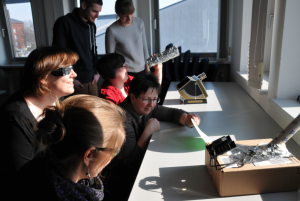
Problem-based learning: Solar eclipse, part II
PBL – the final steps.
Two weeks ago, I described the first five steps of the problem-based learning (PBL) method. Last week, we continued with the workshop and went through the final steps.
Step 6, the research phase, was completed over the week between the two workshops: Everybody worked on questions related to observing the solar eclipse safely. Results of this step were brought together last Friday in step 7:
Step 7 then finally happened on the day of the solar eclipse, March 20th. Everybody was supposed to bring the answers to the questions as well as some sort of equipment made from “household items”. This is what we ended up with:

Participants of the PBL workshop watching the solar eclipse using many different methods. Picture by Alina Gruhn (thanks! :-))
I am going to describe all the different methods in Wednesday’s post, but today I want to focus on the PBL method. We had planned the workshop from 9:30 to 12 am, which luckily coincided pretty much exactly with the solar eclipse. Originally, we wanted to follow the method, i.e. bring together everybody’s results and discuss their merits, and only then start our observation. The idea was to watch over the period of maximum coverage because we thought that would be the most exciting part.
Luckily, though, facilitator Siska was flexible enough* to let us start observing only a couple of minutes into the workshop, when someone realized that we could actually see the moon moving in front of the sun. Everybody got super excited and we even brought in our colleagues who didn’t participate in the workshop to watch with us.
After a while we got back to work, and then clouds started to appear and the weather changed completely. While we had had completely clear, blue skies during the observation, it now became overcast and foggy. Good thing we didn’t wait!
So there were a lot of things to be learned during that workshop, too. (Remember, the topic of the workshop wasn’t really the solar eclipse – we had just used it as an example case. The real goal was for instructors to experience the method before they are to use it in their own teaching!). For example: If your group gets excited during the process – let them run free for a bit and use the momentum to your advantage. You miss the best learning opportunities if you don’t!
—
* need more proof of her flexibility? She was only that very morning told that she would have to fill in for Marisa, who wasn’t well enough to continue running the workshop!
Solar eclipse! - Adventures in Oceanography and Teaching says:
[…] the one in 2015, when we made it the topic of a workshop on how to use PBL in teaching (where the second session was happening exactly at the time of the solar eclipse, so we made it the topic of our case, which […]